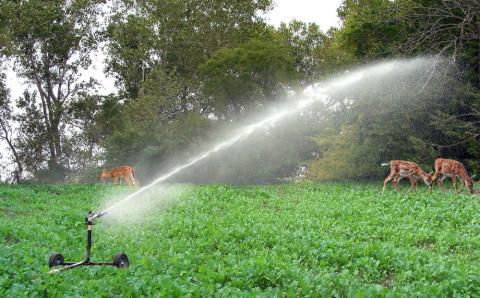Provided by John E. Phillips
Ott DeFoe just won $100,000 for Stage Three of the Major League Fishing (MLF) tour on the Harris Chain of Lakes near Leesburg, Florida. On his journey through this tournament, DeFoe learned again that if you don’t quit, you’ll have a chance to win. Regardless of the odds against him, he won.

Learning During Practice at MLF’s Harris Lakes Event
Before I got to this tournament, I knew that this chain of lakes had been producing some really good bass at this time of the year. I expected the bite to be an offshore bite around lily pads or underwater brush piles. I was really looking forward to the event because I thought there would be a lot of big bass caught.
Regardless of where or when you fish, the weather is usually the biggest factor that determines how you’ll perform. I knew before I reached these lakes that the weather man was predicting very high winds, possibly 15-30 mph, but temperature-wise, the days were predicted to be sunny and beautiful. Toward the end of the tournament, the temperature heated up to the low 90 degrees, and rain was supposed to fall during the practice days and the competition days.
I was asked by a reporter, “Ott, how are you going to fish with those high winds you’ll have, at least on practice days?” Well, any time you’re fishing in the wind, fishing becomes much more difficult. However, wind can help an angler who finds places to fish where the wind creates current. Bass will set up and feed aggressively on the edge of and sometimes in the current. If the area where I’ll be fishing is shallow enough, I can put my Talons down and hold the boat on that spot.
If it’s not shallow, I’ll use the Minn Kota Ultrex Spot-Lock on my trolling motor to hold me on the place I want to fish. The Spot-Lock works off GPS (global-positioning system) to keep me on the exact place I’ve programmed into my trolling motor. Another reporter once asked me, “How much does Spot-Lock on your trolling motor pull your batteries down, if you have to use that feature during most of a day of fishing?” Using Spot-Lock isn’t bad at all. If the wind isn’t too heavy, it’ll run at a slow speed and hold the boat in the position needed for an accurate cast. Even in a high wind, when the trolling motor has to run faster, it doesn’t drain the battery as much as you may think. I use Lithium Pros batteries, made in Knoxville, Tennessee. With these batteries, I can fish two tournament days without recharging them. Many times, I can fish for 3 days without recharging my batteries, however, I typically charge my batteries every night when my fishing day is over.
On the first two practice days, I looked at a lot of water. On the Harris chain, there are eight lakes, as well as quite a few canals, and I tried to look at almost all of that water. I caught bass from one end of that chain of lakes to the other end. At Lake Harris, I found some off-colored water, but I caught some really good, quality bass, primarily in shallow water. I wasn’t expecting to catch the bass in water 6 inches to 2 feet deep. Most of the bass I caught were in 1 to 1-1/2 feet of water. I caught most of the bass in practice on a swim jig and my Rapala OG crankbait.
The swim jig that I caught all my bass on the first day was a 1/4-ounce green-pumpkin Terminator heavy-duty swim jig with a watermelon-red craw-style trailer. I was fishing the swim jig on 50-pound-test braided line on a Bass Pro Shop 7’3” CarbonLite heavy-action rod with a 7.5:1 CarbonLite reel.
Ott DeFoe Had to Abandon Everything He’d Learned from Practice Days and the First Day of the Harris Lake Tournament
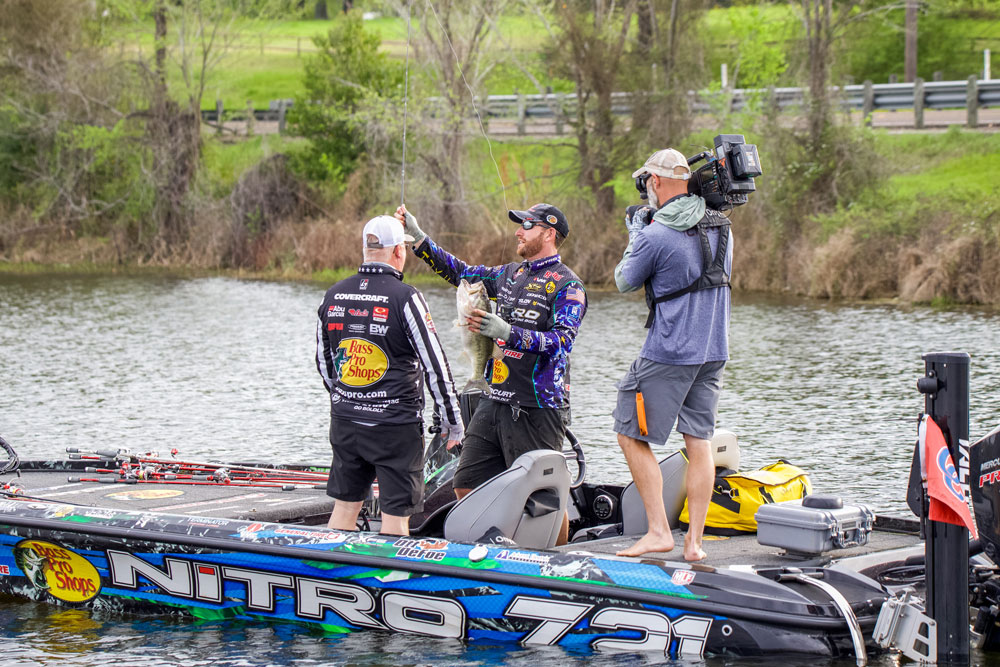
The first day of competition we had quite a bit of wind, but the temperature was warm with plenty of sunshine. The first day of the tournament, I went to one of the places I’d found, where I caught the most scorable bass that had clear water and a lot of hydrilla. However, those scorable bass only weighed a total of 12 pounds that day. Out of my group of 40 competitors, I was in 28th place for Day 1. I was really confused, because the day before I’d caught plenty of bass in this same spot, under the same wind and weather conditions. I couldn‘t figure out what happened to that region to cause the bass not to be there.
I’m sure that many of our readers have had the same kind of days where bass have been holding in one place, but when you’ve returned the next day, for some unexplainable reason, the bass haven’t been there. I was somewhat upset since the spot I was fishing the day before should have put me much higher in the standings than 28th place. All of the fish I caught on Day 2 were caught on the swim jig. Because the region I was fishing was hard to reach, I made the decision to stay there all day.
Our MLF tournaments are set up so that we get to compete for two days, and the number of bass and the size of the bass we catch in those two days will be added together. I knew on that first day of competition that I was down. But I also realized that if I didn’t quit and could catch a number of big bass on the second day, I possibly could get back in the hunt to win the tournament. I decided not to return to the region I’d fished the first day. I knew I had to change the way I was fishing on the second day. In other words, I had to throw everything out of my game plan that I’d learned in practice and on the first day. I knew I’d have to find some new water and a different way to fish if I wanted to catch bass on the second day.
Ott DeFoe Gets 60 Pounds of Comeback Bass on Day 2
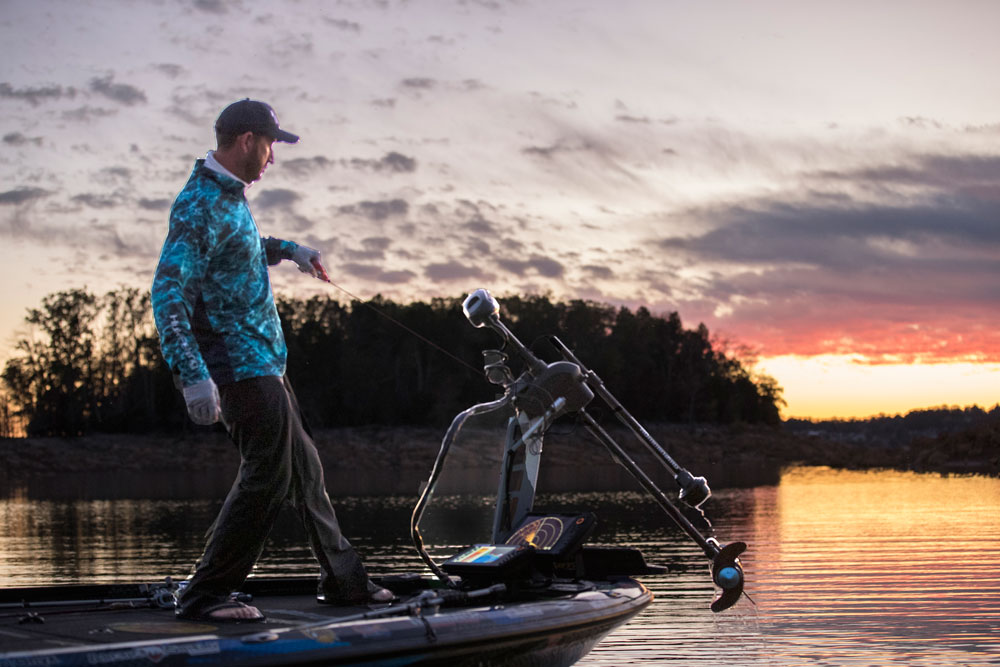
After having a disaster the first day of bassing on the Harris chain of lakes, I decided I’d go to a different lake on Day 2. The first day of the actual tournament I had fished Lake Griffin, so on Day 2, I planned to stay in Lake Harris. I had planned to fish hard cover like boat docks, cypress trees, sea walls and Kissimmee grass. On one of the practice days, I had fished this pattern in Lake Harris. However, on the day I fished, the water was really off-colored. I only could see about 4 inches under the water. Any time I have extremely off-color water to fish, I’ll opt to fish hard cover as well as in some grass. I think the reason the bass go to hard cover when you’re fishing off-color water is because they can ambush bait fish better in stained water.
On the second day of competition, I primarily caught all my bass on a white prototype swim jig with a Bass Pro Shop 3-inch Speed Shad trailer and the Rapala OG Slim. I also caught some bass on a bone-colored topwater lure. I bounced back on the second day and boated 66 pounds of bass with those three lures. Each of the lures produced about the same amount of bass. Of the 66 pounds, I had 29 scorable bass. The OG Slim is a white, flat-sided lure made out of balsa wood with no rattles. If you made a long cast with this lure, it would dive about 6-1/2 feet deep. All the attributes of this lure made it the bait the bass wanted to bite. My biggest bass on Day 2 weighed 3 pounds, 13 ounces.
How Ott DeFoe Moved into Second Place on Day 3
I made the cut to fish Day 3, when all the weights of the competitors who made the cut were zeroed out. Thirty-eight MLF anglers went into the Knockout Round on Day 3 to fish. After this day, the top 8 finishers would be qualified to fish the Championship Round on Day 4. That 60 pounds of bass I’d caught the day before were wiped out. My game plan before the Championship Round day started was to return to the same region where I’d caught 60 pounds of bass on the second day and try to recapture some of that magic.
Although I had a solid day of fishing on the third day, I didn’t catch bass as fast and furiously as I had on the second day. I think I actually lost more and missed more bass on the third day. But by the end of the third period, I felt I’d caught enough bass on Day 3 to be one of the top eight anglers in the Championship Round on the fourth day. I had enough time left in the third period to look at some other areas to fish and to try some other techniques I might need to use to win on the last day of the tournament. On this third day, I was in second place. I’d been fishing the same lures on the same water on the third day that I’d fished on the second day. I was concerned that I might have educated the bass on the third day about my tactics and lures. I thought I might not find as many measurable fish in the Championship Round on Day 4 in that same stretch of water that I’d been fishing.
Ott DeFoe Relearned How to Win a Bass Tournament
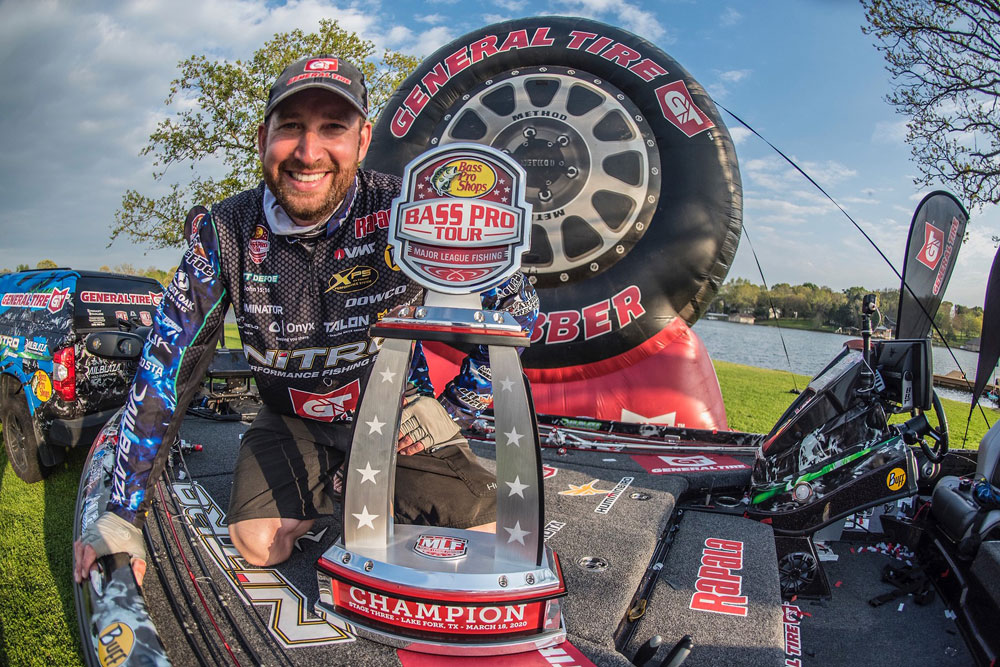
On the last day of the tournament, all the weights went back to zero. The eight of us who were fishing to win in the Championship Round started out the day with no weight. I knew I had to catch as many scorable bass as possible to win the day. So, I started off in a different area than I had fished on Days 2 and 3 and caught a few bass. When the fishing slowed down and the catching became harder, I returned to the same area I’d fished on Days 2 and 3. Although I felt like plenty of bass still were holding in that place, getting those bass to bite was much more difficult than it had been in the past. The bass there had already seen my best tricks. At the end of the first period, I had 13 pounds, and the leader had 27 pounds, making me about 14 pounds off the lead. Once again, I was in a deep hole with the tournament win looking like it was slipping away from me.
Then midway through the second period, I caught more bass than I had in the first period and the first half of the second period. I was fishing the same shoreline I’d fished for 2 other days, but I started fishing it from another direction. I discovered a small zone during the last 30 minutes of the second period where I started catching bass quickly. I knew the other seven contestants weren’t catching bass as fast as I was. By the end of the second period, I’d moved into first place by about 1-1/2 pounds.
I was fishing 300 yards of a bank that was 5-6 miles long. I’d pull into a point, fish down the bank from left to right for about 300 yards, return to my starting point and fish that same bank from the same direction. Once I reached the place where I normally would turn around and go back to my starting point, I decided to fish about 20 yards past it. I made one more cast, caught a small bass, fished 10 more feet down the bank and caught a scorable bass. I kept my trolling motor down and kept fishing up the bank until I hit a sweet spot and caught several more scorable bass.
At the beginning of the third period, I caught a good bass that increased my lead and then quickly caught a second, scorable bass. That’s when I turned my boat around and went back down the bank from the opposite direction. But this time, I fished further away from the bank and made longer casts to the areas that had produced bass for me before. I switched from the swim bait to the Rapala OG Slim crankbait. I discovered a little spot where some Kissimmee grass cornered into a dock. I cast to that little pocket and caught a 2-pounder. Then on the very next cast, I caught a bass that weighed 5 pounds, 12 ounces. Those two bass took my total weight of bass for the day from a 5-pound lead to a double-digit lead.
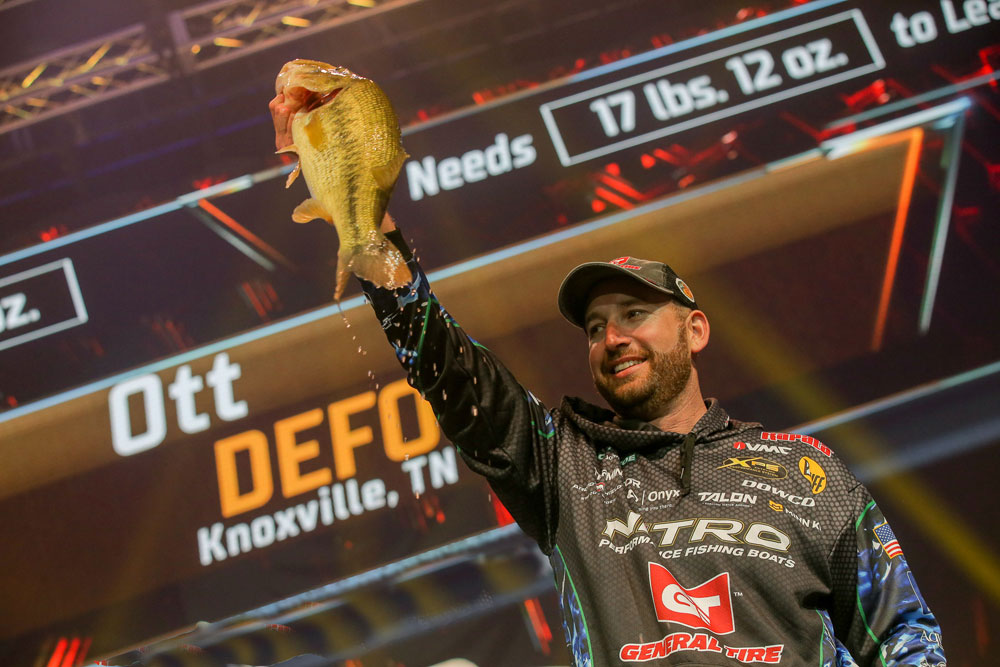
After I weighed and released the bass that weighed 5 pounds, 12 ounces, I felt like I could do no wrong. I’d pick up the swim jig and catch a bass. Then I’d change and fish the crankbait and catch another bass. With 20 minutes left to go in the tournament, I had a 20-pound lead over the other seven competitors. I felt like I had a good chance to win. However, in a bass tournament, you never know what will happen. Someone may have a fantastic last 20 minutes and beat you by a pound or even only a few ounces.
Hearing the referee announce, “Lines Out,” signifying the end of the tournament, followed by the words, “You Won,” is a feeling that never gets old. On the way back to receive my trophy and pick up my check for $100,000, I reflected back to the first day when I’d had such a terrible finish and had to start all over again on the second day. To be honest, after that terrible first day, I had no expectations of winning this tournament.
But at the end of the tournament, Ott DeFoe relearned that any time you fail, if you don’t quit, you’ll still have a chance to win. At two different times in this tournament, all hope of winning seemed to have passed DeFoe by. However, by keeping on, DeFoe was able to snatch victory from defeat because he didn’t give up mentally or physically.














